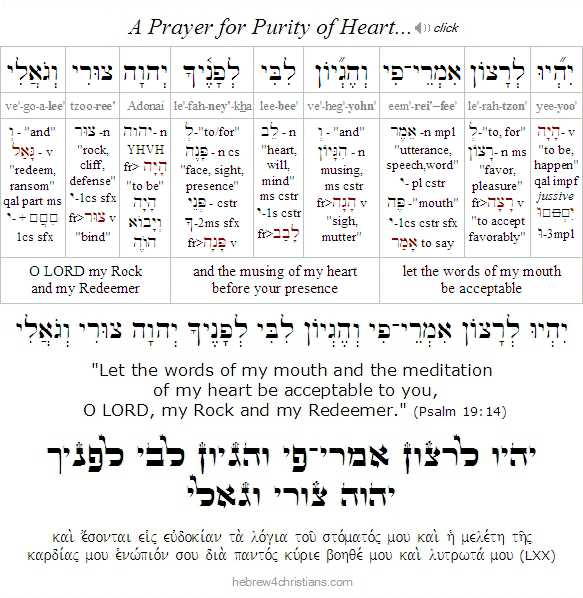|
Among other topics, parashat Mattot mentions vows (i.e., nedarim: נְדָרִים) and oaths (i.e., shevuot: שְׁבוּעוֹת) made to the LORD (Num. 30:2-3). The sages distinguish between these by saying that a vow (נֶדֶר) represents a promise to do something (or to refrain from doing something), whereas an oath (שְׁבוּעָה) represents a sworn testimony that something is true (or false). Among Orthodox Jews, it is customary to say "bli neder" (בְּלִי נֶדֶר) after making any sort of commitment to avoid the risk of making a vow. Bli neder means, "I'll do my best to keep my word to you on this, though understand that I am not taking a vow..." Just before Yom Kippur, the Kol Nidrei service is intended to absolve legal liability for failing to keep personal vows. The Aramaic phrase kol nidrei (כָּל נִדְרֵי) means "all vows."
The Torah states that a whoever makes a vow or takes an oath "shall not break his word" (לא יַחֵל דְּבָרוֹ). The word translated "break" comes from the root chalal (חָלַל) which means to profane or make unholy. This is the same root used in the phrase chillul Hashem (חִלוּל הַשֵּׁם) which means to desecrate the Name of the LORD: "And you shall not profane (חָלַל) My holy name; but I will be sanctified (קָדַשׁ) among the children of Israel: I am the Lord who sanctifies you" (Lev. 22:32). Since it is chillul HaShem to break your word, keeping your word is a form of kiddush HaShem (קִדּוּשׁ הַשֵּׁם), "sanctifying the Name of the LORD."
The Torah links both vows and oaths with the soul (i.e., nefesh: נֶפֶשׁ). An oath is considered a "bond" or a binding obligation upon the soul (lit., "a bond on his soul," אִסָּר עַל־נַפְשׁוֹ). This statement leads to the question about the relationship between our words and the state of our souls....
In Genesis 2:7, the Scriptures describe the creation of man: "Then the LORD God formed (יֵצֶר) the man of dust from the ground and breathed (נָפַח) into his nostrils the breath of life (נִשְׁמַת חַיִּים), and the man became a living soul (נֶפֶשׁ חַיָּה)." The word yetzer ("formed") refers to something shaped, like pottery fashioned by the hand of a potter. Just as a potter purposes a shape before forming an object, so God intended the image of man. The sages use the analogy of a glassblower who creates a glass vessel. Just as a glassblower blows into a tube to form a vessel from molten glass, so the breath (i.e., neshamah: נְשָׁמָה) that comes from the LORD functions as spirit (רוּחַ) that forms the human soul (i.e., nefesh: נֶפֶשׁ). The Targum states that God breathed into Adam the ability to think and to speak. In other words, thought and speech are two primary characteristics of the image (tzelem) and likeness (demut) of God. Our use of words is directly linked to the "breath of God" within us, and therefore breaking our word defaces the image of God within us....
The LORD God of Israel is faithful and true (Deut. 7:9; Psalm 12:6; Matt. 24:35). He always keeps His word and therefore He wants us to do so as well. Indeed, Yeshua Himself is called the Word of God (דְּבַר הָאֱלהִים). As image bearers of God, our words likewise are to carry deep meaning and sanctity. Just as God's words are trustworthy, true, and lifegiving, so should be our words and communication. The sages say that the words we speak - whether good or bad - call for a response in the realm of spirit. This is hinted at by the Hebrew word for "thing" (i.e., devar: דָּבָר), which also means "word." Listen to the words of your heart and understand that they are devarim, "things" that are defining the course of your life right now. Our thoughts and words "exhale" the breath of God that was given to each of us. In a very real sense they are "prayers" we are constantly offering...
Yeshua warned us to abstain from making any kind of vow or oath since our word alone should be enough (Matt. 5:33-37). He also spoke of "good and evil treasures of the heart" that produce actions that are expressed in our words (Luke 6:45). Our inward motive determines our thinking, which in turn affects the way we act and use words. Therefore He warned: "I tell you, on the day of judgment people will give account for every careless (ἀργὸν) word they speak, for by your words you will be justified, and by your words you will be condemned" (Matt. 12:36-37). Our very salvation is based on confession of the truth, and therefore we must be sure to use communication as a means of expressing the love and grace of God (Rom. 10:9; Col. 4:6). We must be on guard to keep away from lashon hara (evil speech) by focusing on what is worthy, lovely, and of good report (Prov. 13:3, Phil. 4:8). As David prayed: "Let my words and my inmost thoughts be acceptable before you, O LORD, my Rock and my Redeemer" (Psalm 19:14):
יהיו לרצון אמרי־פי והגיון לבי לפניך
יהוה צורי וגאלי
yee·he·yoo · le·ra·tzon · eem·rei - fee · ve·he·ge·yohn · lee·bee · le·fa·ney'·kha
Adonai · tzoo·ree · ve·go·a·lee

Let my words and my inmost thoughts be acceptable before you,
O LORD, my Rock and my Redeemer.
(Psalm 19:14)
Hebrew Study Card

Click to learn the Hebrew text:

May it please God to help us use our words for the purpose of strengthening and upbuilding (οἰκοδομὴν) one another (Eph. 4:29). May our words always be gracious and "seasoned with salt" (Col. 4:6). Amen. "Whoever keeps His word, in him truly the love of God is perfected" (1 John 2:5).
|




